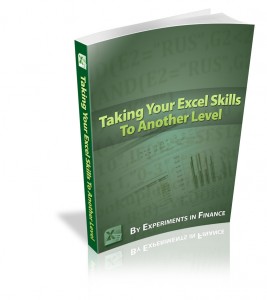The sibling rivalry between my (younger) brother and me takes a rather geeky form. I realized recently in talking to friends that we’re a very unusual case, because rather than arguing over who owes what money to whom, or who needs more money from mom and dad, we argue over who gets to pay. Maybe it’s just typical Asian upbringing at work.
A couple of months ago, we both paid a visit to our parents. I rented a car which he never used, we bought a Mother’s Day present on my credit card, and as usual, he insisted on paying for meals and everything else he could get his hands on. Not that I would have made him pay me back even without his nice gestures, but after all that, we were nothing if not even. He still insisted that I take a check back with me on my flight. I did, and kept it just long enough to shred it as soon as I got home.
Noticing that I never cashed the check, he sent me the following sardonic email:
Now I have to write a new check and mail it to you. As a business case, this illustrates:
- waste of resources, as evidenced by the need to use a new check, an envelope, and stamp;
- duplication of effort; and
- a breakdown in communication, leading to a “disconnect” between expectations and outcome.
Going forward, let’s try to optimize our efforts, and exhibit best-in-class cooperation.
My brother doesn’t have an MBA degree, but he sure nailed all the right terms and nuances. It just goes to show you how much doublespeak there is in business, and how it’s just another language to master like any other (and easier to mock or BS, I might add).
Why do people in business and finance talk this way?
Honestly, I often think it’s so their lack of knowledge won’t be discovered, like in the tale of the Emperor’s New Clothes. I remember being in Chicago when I was younger once and wondering to myself what life was like for those people dressed in expensive overcoats and suits walking in and out of towering buildings in the financial district.
Going to business school demystified the mirage that those people knew more or were more capable than I was. And many a time in my life have I gone into a new job slightly intimidated by how much there was to learn only to discover upon a little prodding that the knowledge everyone had was only superficial. As far as investing is concerned, you can probably count on one hand the number of real experts with a proven track record there are in the field. So I say, go into business and investing situations with confidence, and don’t be afraid to ask questions and push “experts” a little harder for explanations.
Times like these, I recall a book review in the Economist that claimed people would learn more about management by reading a classic like Shakespeare’s Henry IV, Part II than most business books out there. That describes my philosophy completely!
Financial Reflections wrote a post earlier this week asking why brokers are so hard to understand, including a list of terms found on a newsletter. I have to agree that people in finance and business (and science, sometimes) like to make things much harder and more complicated than they need to be.
Granted, part of the reason there’s specialized terminology when talking about investing is that it helps to have a common language. But even then, you’d be surprised how many variations there are in definitions for small-caps, micro-caps, mid-caps, large-caps, growth, value, etc.
And “durable goods” are goods that are not immediately consumed or used up, but I have seldom if ever heard of anything classified as “consumer nondurable stocks”. Consumer staples (things people buy regularly because they need them, and that don’t fluctuate as much with income), yes. Consumer discretionary (things that people buy at their discretion, when perhaps more money is available, and cut back on when times are hard), yes.
But that doesn’t mean that “consumer nondurable stocks” doesn’t exist, only that some different sort of convention is being used. The most common classifications for sectors and industries are GICs and NAICS, and SICs. I was only able to find one real source that gave examples of “consumer nondurable stocks”, on MSN Money. Taking Energizer (ENR) as an example, you’ll notice that other places more commonly classify the stock as an Industrial.
No formal education on this stuff really exists. I happened to take a class on portfolio management that ran through these classifications quickly; otherwise, I wouldn’t have recognized or known about them without serious effort to learn about them on my part.
A lot of the other terms on that list are buzzwords, just like how people enjoy throwing around the words “leverage” and “synergy” in the corporate world.
***************************************************
Look Good at Work and Become Indispensable Become an Excel Pro and Impress Your Boss

***************************************************


Financial Methods
Carnival of the Capitalists…
There are many great posts for this week’s Carnival of the Capitalists. I particularly enjoyed:Breakeven Point Before Real Returns at The Real Returns Circumventing Late Fee Anger at BusinesspunditCreative Job – Commute Helper at Personal Finance Advi…
Jaffer
Your web is very excellent, can I have my PhD dgree through you, or MBA in finacne